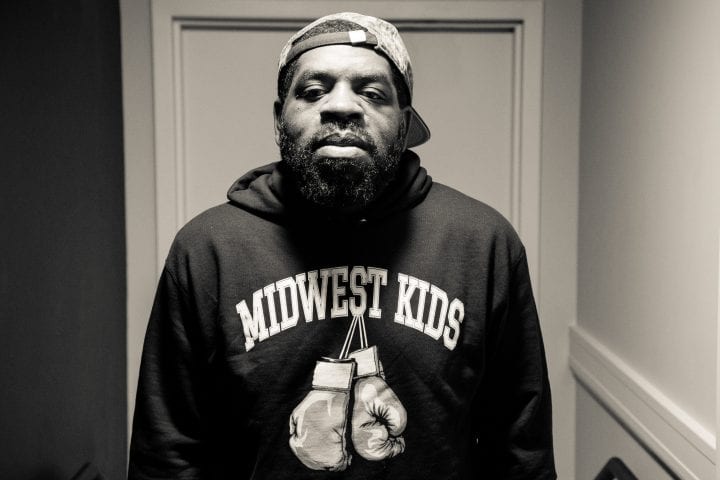
“What Lineage Affords Us:” Insights on Life & Writing from Hanif Abdurraqib
October 29, 2019
Sometimes, when we hear a poem, we struggle to make sense of it—its meaning, its tone, or our affinity to its writer. And then, sometimes, certain poems feel handed to us. Much like a gift, you don’t have to work hard to feel a kinship with it. Hanif Abdurraqib’s Hinge reading on October 23 was exactly like that. To quote the evening’s Q&A moderator, poet Quenton Baker, Hanif’s work “gives people that opportunity to grow and change, and I think everyone here has seen it and felt it and is here because of that.”
During the Q&A, it became clear that part of the reason Hanif’s work makes people feel this way, whether its his poetry, memoir, or music criticism, is because he spends a lot of time thinking about how writers are so much more than what they produce. A lot goes into the creation of a poem that extends beyond technical choices—so it’s no surprise that his insights on writing are more about a life well-lived than they are about the mysteries of enjambment. Read on for some great perspectives from Hanif and Quenton’s Q&A.
Note: these quotes have been lightly edited for concision.
On liner notes: I got into poems around 2012. I don’t have an MFA, I didn’t study writing in college, I didn’t get any kind of “formal” training when it comes to writing—so what I had to do was build my own MFA. What I did was: I would ask people for book recommendations, and whenever someone recommended something to me, I would read that book, and if I liked it, then I would go to the acknowledgements page and circle all the poets whose names I recognized (which, early on, was not many people). Then, I would get those people’s books and read their acknowledgements, and do the same thing over again.
On poetic lineage: I’m so grateful for what lineage affords us in terms of crafting our own mythologies and our own voices out of the people who were doing it before we were here. And, it gives us a clear knowledge, so that I’m not out here thinking that I’m the only person to do these things—I don’t ever want to be so irresponsible that I think I’m the first to do something. Instead, I think it’s very generous to know that not only am I not the first but that others have probably done it better—and I can go back and sit at the feet of what they did, and really marvel at it, and see if I can weave my way into a larger attempt to fit into what they were doing.
On being a writer who lives in Ohio: When I get asked [why I live where I live] by people in interviews who live in New York or wherever, they ask it as though my living there is a failure of my imagination and not theirs. As a writer, I’m there [in Columbus, OH] because the entire architecture of my life, through all of its complications and all of my frustrations with the place, is in this place. Living in Columbus reminds me that I am a person and not a product.
On assembly: I so appreciate being witness to a coming together of people. Part of this, I imagine, is because when you’re young, you’re never as much of an outsider as you probably feel like you are—you know, you get the black kids who listen to one Wheezer song and they’re like, “I’m on the outside.” […] In some ways, because I imagined myself as this outsider [as a young person], I moved through the world as witness, longing for the closeness that assembly has to offer […] There’s something about assembly that tells me about myself, and what I have longed for and have been fortunate enough to revel in—the things that I miss, and the things that I will miss, and the things that I hopefully will get to stumble upon again—I get to see that through the eyes of other people, and that is really a generosity.
On fandom: I get so frustrated when critics look down on young people enjoying music—particularly young people who aren’t male—because that is where the greatest manifestations of fandom that live outside of the body are happening. Things that I felt when I was young that I didn’t know how to express, I’m getting to watch people express those things in real time, and I’m building a language for everything that I lived through and couldn’t speak out loud.
On support: Most of the writers I’m close to, we don’t talk about writing at all. I’m pretty disinterested in talking about writing—at least in the sense that I think people imagine how poets talk about writing with each other, where we’re just sitting around going, “Hmmm, enjambment.” I’m disinterested in conversations about writing in the very technical sense. I’m very interested in conversations about the full ecosystem about writing, and ways to make it more equitable, to make it more accessible to folks […] I want to talk about the things that make us people outside of our work because I think in doing that, we again pull away from this idea that a writer is what they produce, and that that’s where the fullness of a person ends. So I want to talk to my friends about comics or sports or snack foods.